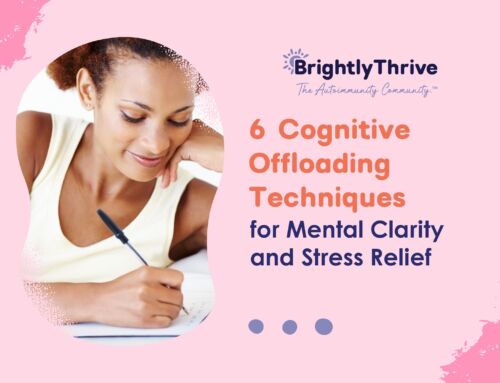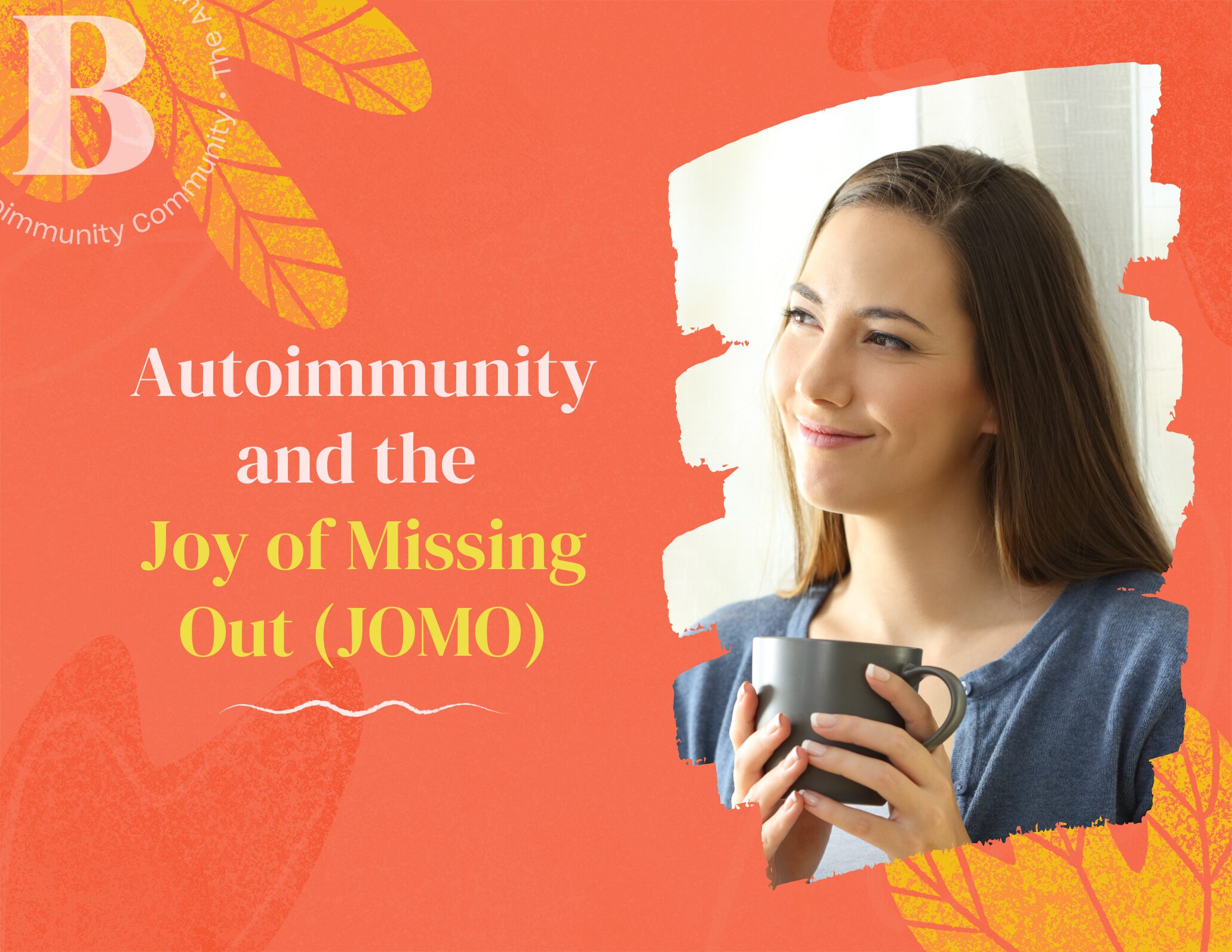
Autoimmunity and the Joy of Missing Out (JOMO)
Can an autoimmune condition create the joy of missing out (JOMO)?
For many of us, we know all too well what having autoimmunity costs us…
Dreams and aspirations that once seemed within reach now seem distant and unattainable. Potentials we were eager to explore lie dormant, untouched.
The landscape of our lives is dotted with so many what-ifs and questions left unanswered, each one a reminder of paths not taken, and opportunities missed.
Often, this state of loss can lead to a profound sense of grief from within.
It’s a grief that is not always observed by others but is deeply felt by those who live with it.
This internal sorrow is compounded by our society’s tendency to capitalize on every human’s fear of missing out (FOMO).
Social media and societal expectations amplify this fear, constantly reminding us of what we’re supposedly missing and the person we should have been.
We see friends and acquaintances achieving milestones, attending events, and living seemingly fulfilled lives, while we are left grappling with the limitations imposed by our conditions.
Autoimmunity can feel like an uninvited guest that overstays its welcome, rearranges your plans, and leaves you to clean up the mess.
But what if this uninvited guest also brings an unexpected gift?
A gift wrapped not in bright paper, but in the quiet, sometimes difficult moments that teach us the art of JOMO – the Joy of Missing Out.
Embracing the Joy Of Missing Out
Living with an autoimmune condition often means missing out on events, opportunities, and the hustle and bustle of everyday life.
But within these absences, there lies a unique opportunity to discover a different kind of joy. Here’s how:
1. Prioritizing Self-Care: Autoimmunity demands you to listen to your body, to rest when you need to, and to prioritize your well-being. This focus on self-care can transform your relationship with yourself, turning self-compassion from a nice-to-have into a necessity. It’s like becoming your own best friend, cheering yourself on during the rough days.
2. Finding Beauty in the Slow Moments: When you’re not rushing from one activity to another, you start noticing the little things – the way sunlight filters through the trees, the comforting sound of a favorite song, or the simple pleasure of a good book. These moments, often overlooked in a fast-paced life, become precious and deeply fulfilling.
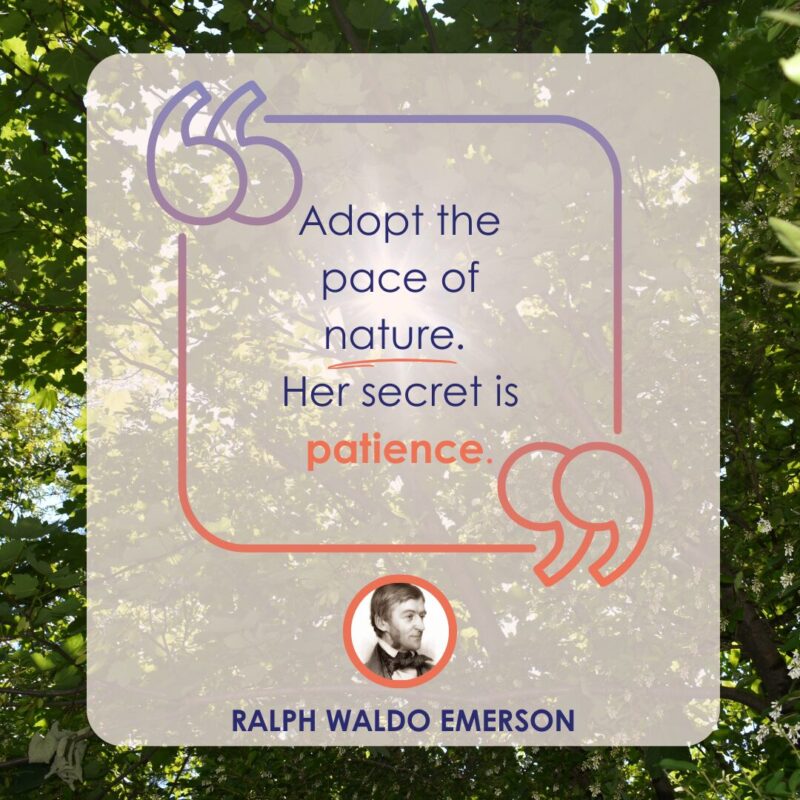
3. Cultivating Mindfulness: Missing out on external activities can lead to a richer inner life. Mindfulness practices like meditation and journaling become not just tools for coping, but gateways to a deeper understanding of yourself and the world around you. It’s like finding a hidden room in your house that you never knew existed, filled with treasures waiting to be discovered.
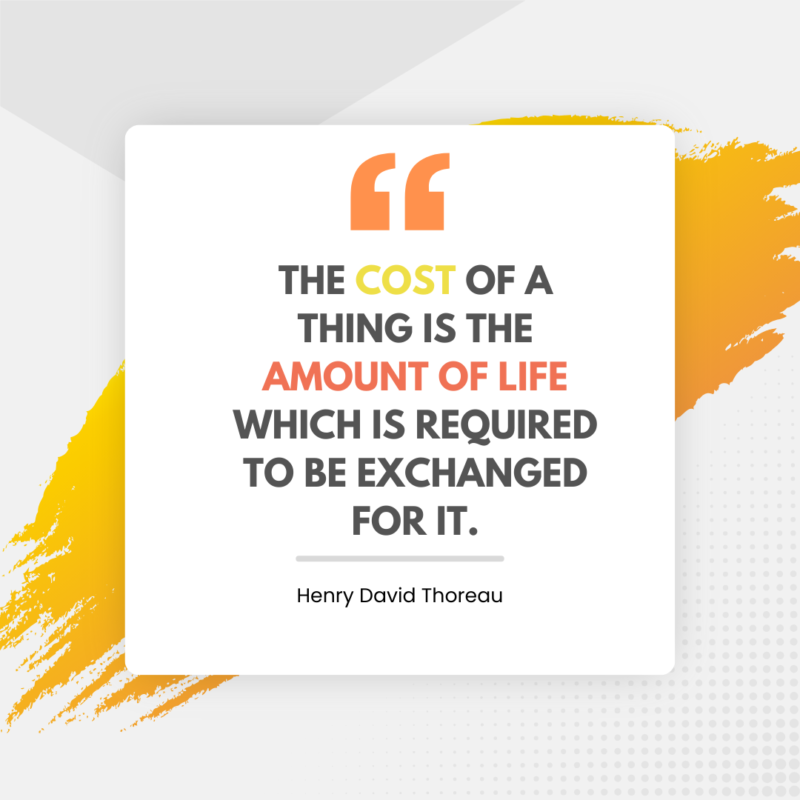
A prominent American writer, Henry David Thoreau, reminds us that in every commitment, every event, and every pursuit we engage in requires a part of our life in exchange.
By embracing JOMO, we choose to invest our precious energy into meaningful activities, rather than spreading ourselves thin trying to keep up with everything and everyone. This constant pursuit assumes we can be everything and everywhere all at once, which ultimately causes our humanity to suffer. Practicing JOMO allows us to cherish the slow moments and find joy in what it truly means to be human – being in the present, instead of always yearning for more.
Practical Ways to Cultivate JOMO
Embracing the Joy of Missing Out (JOMO) while living with an autoimmune condition can transform the way you experience life.
Here are some practical ways to make the most out of JOMO and turn your moments of missing out into opportunities for growth and joy:
1. Set Boundaries and Say No with Confidence:
-
- It’s essential to recognize your limits and respect them.
- Politely decline invitations and activities that drain your energy or don’t align with your current priorities. Saying no is a powerful act of self-care.
2. Create a Self-Care Routine:
-
- Develop a daily self-care routine that includes activities like gentle exercise, adequate rest, and nourishing meals.
- Incorporate practices such as stretching, deep breathing, and relaxation techniques to help manage stress and improve your overall well-being.
3. Unplug Regularly:
-
- Schedule regular breaks from digital devices and social media.
- Use this time to engage in offline activities that bring you joy, such as reading, gardening, or spending time with loved ones.
- Disconnecting from the constant influx of information can help you reconnect with yourself and the present moment.
4. Practice Mindfulness and Meditation:
-
- Incorporate mindfulness and meditation into your daily routine.
- These practices help you stay grounded, reduce stress, and enhance your awareness of the present moment.
- Embrace the Japanese concept of “yutori”
View this post on Instagram
The Japanese concept of “yutori” means “spaciousness” or “having room to breathe.” It focuses on creating balance and space in your life, allowing you to enjoy the present moment fully. By incorporating yutori into your daily routine, you can foster mindfulness and a deeper appreciation of the beauty around you.
5. Engage in Creative Hobbies:
-
- Explore hobbies and activities that spark your creativity and bring you joy.
- Whether it’s painting, writing, knitting, or playing a musical instrument, engaging in creative pursuits can be therapeutic and fulfilling.
6. Find Beauty in Nature:
-
- Spend time outdoors and appreciate the beauty of nature.
- A walk in the park, sitting by a lake, or simply enjoying your garden can be incredibly rejuvenating.
- Nature has a calming effect that can help you find peace and perspective.
7. Prioritize Quality Over Quantity in Relationships:
-
- Focus on nurturing deep, meaningful connections with a few close friends and family members rather than spreading yourself thin over numerous acquaintances.
- Quality relationships provide emotional support and enrich your life.
8. Journal Your Journey:
-
- Keep a journal to document your thoughts, feelings, and experiences.
- Writing can be a powerful tool for self-reflection and growth. It allows you to process emotions and gain insights into your journey with autoimmunity.
9. Practice Gratitude:
-
- Regularly reflect on and write down things you are grateful for.
- Practicing gratitude can shift your focus from what you’re missing out on to what you have, fostering a more positive outlook on life.
10. Simplify Your Life:
-
- Declutter your physical and mental space.
- Simplify your commitments and focus on what truly matters to you. This can reduce stress and help you live more intentionally.
Achieving Balance with JOMO
While JOMO encourages mindful participation and prevents overindulgence, it’s essential NOT to isolate yourself completely.
Staying connected with supportive friends and family is vital for emotional well-being, especially when managing a chronic illness like autoimmune.
To find the right balance, be intentional about social activities, communicate your health needs, utilize virtual connections to support your wellbeing, and allocate time for self-care.
Join BrightlyThrive today and connect with a supportive community and access expert resources tailored to your healing journey.
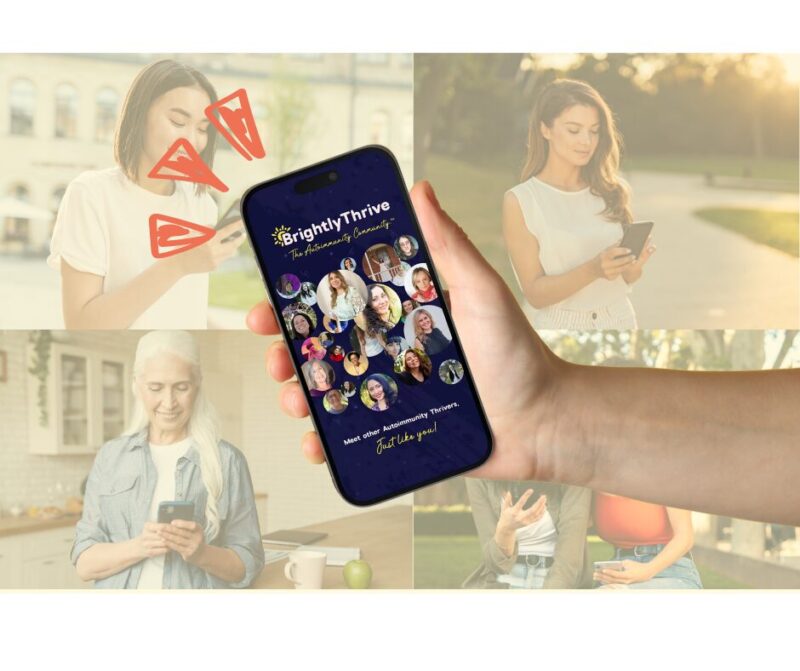
Conclusion
Living with an autoimmune condition presents its own set of challenges, but embracing JOMO can transform those challenges into opportunities for personal growth and joy.
By prioritizing self-care, finding beauty in slow moments, and cultivating mindfulness, you can create a fulfilling and balanced life.
Remember, it’s about finding joy in the present moment and appreciating the journey, even if it means missing out on certain aspects of the hustle and bustle.
References
Sirois, F. (n.d.). How to ditch ‘fomo’ and foster ‘jomo’ – the joy of missing out. The Conversation. https://theconversation.com/how-to-ditch-fomo-and-foster-jomo-the-joy-of-missing-out-200400
Casey, O., & Miller, F. W. (2024, February 20). Autoimmunity Has Reached Epidemic Levels. We Need Urgent Action to Address It. Scientific American. https://www.scientificamerican.com/article/autoimmunity-has-reached-epidemic-levels-we-need-urgent-action-to-address-it/
Paulley, J. (1983). Pathological Mourning: A Key Factor in the Psychopathogenesis of Autoimmune Disorders. Psychotherapy and Psychosomatics, 40(1–4), 181–190. https://doi.org/10.1159/000287766
What to Know About Disenfranchised Grief. (2024, February 25). WebMD. https://www.webmd.com/mental-health/what-to-know-about-disenfranchised-grief
Rast, J. (n.d.). Endless Scrolling and Endless Worries: The Impact Social Media Has on FOMO. The La Salle Falconer. https://lasallefalconer.com/2024/05/endless-scrolling-and-endless-worries-the-impact-social-media-has-on-fomo/
How do you care for others in stressful times? (n.d.). https://www.fidelity.com/learning-center/personal-finance/self-care-and-compassion
H, M. (2024, February 13). Slowing Down in a Fast-Paced World: Paths to Mindful Living. Medium. https://medium.com/@moni.sa.haeussler/slowing-down-in-a-fast-paced-world-paths-to-mindful-living-7eb5b54fe158
Nash, J. (2024, May 23). Embracing JOMO: Finding Joy in Missing Out. PositivePsychology.com. https://positivepsychology.com/jomo-joy-of-missing-out/
Reinke, T. (2024, March 4). The Only FOMO to Fear. Desiring God. https://www.desiringgod.org/articles/the-only-fomo-to-fear
Sima, R. (2024, March 4). Forget FOMO. Embrace JOMO to discover the joy of missing out. Washington Post. https://www.washingtonpost.com/wellness/2024/01/04/fomo-jomo-joy-missing-out/
Psychology Today. (2021, November). The power of saying no. Mind Matters from Menninger. https://www.psychologytoday.com/us/blog/mind-matters-from-menninger/202111/the-power-of-saying-no
Tee-Melegrito, R. A. (2023, March 28). What are examples of self-care? https://www.medicalnewstoday.com/articles/self-care-examples
Garcia, T. (2023, August 18). Disconnect To Reconnect: Unplug For Increased Happiness. Be Calm With Tati. https://www.becalmwithtati.com/disconnect-to-reconnect/
Segal, Z. (2019, April 16). Staying Grounded through Difficulty. Mindful. https://www.mindful.org/staying-grounded-through-difficulty/
Kumar, V., Pavitra, K., & Bhattacharya, R. (2024). Creative pursuits for mental health and well-being. Indian Journal of Psychiatry/Indian Journal of Psychiatry, 66(Suppl 2), S283–S303. https://doi.org/10.4103/indianjpsychiatry.indianjpsychiatry_781_23
Ecopsychology: How Immersion in Nature Benefits Your Health. (n.d.). Yale E360. https://e360.yale.edu/features/ecopsychology-how-immersion-in-nature-benefits-your-health
A Way to Calm Your Mind and Let go of Attachment. (2022, October 17). Ikigai Tribe. https://ikigaitribe.com/vlog/a-way-to-calm-your-mind-and-let-go-of-attachment/
Umberson, D., & Montez, J. K. (2010). Social Relationships and Health: A Flashpoint for Health Policy. Journal of Health and Social Behavior/Journal of Health & Social Behavior, 51(1_suppl), S54–S66. https://doi.org/10.1177/0022146510383501
Journaling for Emotional Wellness – Health Encyclopedia – University of Rochester Medical Center. (n.d.). https://www.urmc.rochester.edu/encyclopedia/content.aspx?ContentID=4552&ContentTypeID=1
Van Horn Mcmhc Lpc-C, H., & Van Horn Mcmhc Lpc-C, H. (2023, November 2). Journaling About Feelings: How to Explore and Express Emotions. Day One | Your Journal for Life. https://dayoneapp.com/blog/journaling-about-feelings/
How Gratitude Can Increase Positivity. (n.d.). Headspace for Organizations. https://organizations.headspace.com/blog/how-gratitude-can-increase-positivity
Sorgen, C. (2008, August 25). Cut the Stress, Simplify Your Life. WebMD. https://www.webmd.com/a-to-z-guides/features/cut-stress-simplify-life
Umberson, D., & Montez, J. K. (2010b). Social Relationships and Health: A Flashpoint for Health Policy. Journal of Health and Social Behavior/Journal of Health & Social Behavior, 51(1_suppl), S54–S66. https://doi.org/10.1177/0022146510383501
Ai, V. (2023, October 27). Social Support and its Influence on Chronic Illness Management: Lessons from Behavioral Science. https://www.linkedin.com/pulse/social-support-its-influence-chronic-illness-management-lessons-3flbf/
TAGS:
CATEGORIES:



